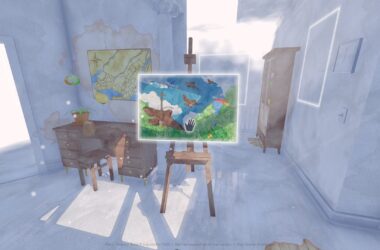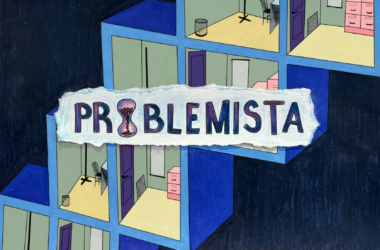Eurydice, written by Sarah Ruhl and directed by Rachel Paul, modernizes Greek mythology by setting the story of Eurydice in contemporary times. As risky as it sounds, Paul manages to pull it off.
According to Greek mythology, Orpheus (played by Marko Djurdjic) has a great musical gift and is known as the “chief among poets and musicians.” He struggles between his love for music and his love for Eurydice (played by Megan Stewart), a fondness that Eurydice recognizes but ignores. However, unlike in the classical myth, Eurydice is presented from Eurydice’s point of view.
“[It’s] a beautiful exploration of the connection between our experiences of love and loss,” says Paul, whose past McGill directorial experience includes Hair and Miss Julie. “At it’s simplest, Eurydice is about the depth of human connection.”
The audience steps into Players’ Theatre shoeless and is instantly transported into the Underworld. The theatre’s dim lighting and beautiful floor¬ – which took 10 days to paint – create a wonderous effect.
The first scene of the play is reminiscent of the first scene in Grease: two young lovers frolic together, oblivious to the world around them. This opening scene ties the audience emotionally to the two characters on stage – their raw affection is convincing and touching. This connection between actors and audience carries on throughout the entire play.
As the myth goes, Eurydice dies and ends up in the Underworld, an afterlife ruled by a crazy evil little boy (played by Cory Lipman) and inhabited by whimsical stones (played by Amelia May Haskell, Ayla Lefkowitz, and Fiona Penny), who tell Eurydice that love and memories are forbidden among the dead. Despite these rules, Eurydice reunites with her father (Francois Macdonald), and is slowly reminded of the relationship they once had. This father-daughter love is beautifully acted – for instance, when he creates for Eurydice a room out of string, even though rooms are not allowed in the Underworld.
Meanwhile, Orpheus grieves over his lost love. He learns that the only way to reconnect with his lost Eurydice is to retrieve her from the Underworld. He descends into it by playing heartbreaking music, and meets the Lord of the Underworld, who – as in the original myth – tells Orpheus the only way to be reunited with Eurydice is for him to walk away and not look back. Yet in this new version, interesting questions and a deeper understanding of the characters arise from one final twist on the classic ending.
“The play itself is really well-written,” says Paul. “It’s quirky and weird and poignant and poetic. It’s a good play. [Ruhl is] an excellent playwright.”
The most engaging aspect of the play is not the whimsical tone, but the deeper meaning within the characters’ intricate relationships; each character is so interesting that it’s truly hard to take your eyes off of any one actor throughout the play. Additionally, Djurdjic and Stewart have an undeniable chemistry that is only intensified by the script. For example, Orpheus plays a song and asks Eurydice if she will remember it, to which she replies, “I will always remember your melody; it will be imprinted on my heart like wax.” Best of all, there is depth to each character and the actors seem to have imbued their characters with a sense of authenticity.
Despite the apparent simplicity of the play’s themes, the core of the story still revolves around the struggle between life’s purest pleasure and its related hardship: love and loss. Paul does an amazing job capturing these raw emotions in her characters.
Eurydice is an inspiring play that captures the most mysterious yet beautiful parts of life, shown through the imagination and creativity of the extremely talented actors and director.
Eurydice is playing January 27-30 at 8 p.m. at Players’ Theatre. Tickets are $6 for students and seniors, and $8 for adults. For reservations email [email protected].








